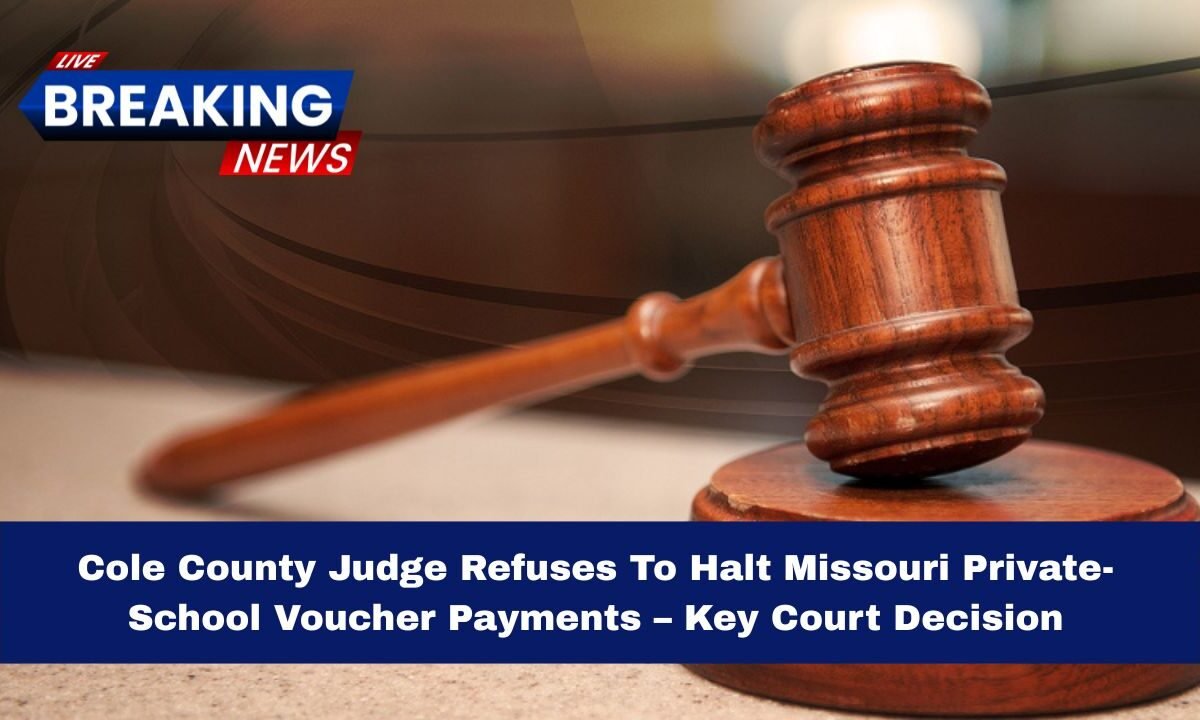In a major decision that has sparked strong debate across Missouri, a Cole County judge has ruled that $51 million in state funds can continue flowing to private-school scholarships under the MOScholars program.
The ruling comes even as a lawsuit challenges whether the funding is constitutional. While the case will continue for months, the immediate outcome ensures that thousands of students and families will still receive financial support this school year.
Background of the Case
The MOScholars program began in 2021 as a donation-based scholarship fund, allowing individuals and corporations to donate money in exchange for a 100% tax credit.
The funds were then used to provide scholarships for students to attend private schools, including many children with disabilities and those from low-income families.
In 2025, Missouri lawmakers changed how the program was funded. Instead of relying solely on private donations, they redirected $51 million of general state revenue into the program.
This shift effectively transformed MOScholars into a state-funded voucher program rather than a purely donation-based system.
This change sparked a lawsuit from the Missouri National Education Association (MNEA), the state’s largest teachers union. The union argued that using taxpayer dollars in this way was unconstitutional and would harm public schools, especially in rural communities.
The Judge’s Decision
On August 25, 2025, Judge Brian Stumpe issued a ruling that allowed the program to continue while the lawsuit moves forward.
- He denied the teachers union’s request to freeze the funds, meaning that the $51 million will continue to support scholarships during the school year.
- At the same time, he also refused the state’s request to dismiss the lawsuit. This means the case will still go to trial and could result in a different outcome later.
The decision represents a temporary win for the Missouri State Treasurer’s Office and supporters of school choice, but it also leaves the door open for further legal battles.
Arguments from Both Sides
Teachers Union (MNEA)
The MNEA argued that:
- The state does not have statutory authority to funnel general revenue into the MOScholars program.
- Once the money is spent, it cannot be recovered, creating potential misuse of taxpayer funds.
- Redirecting tax dollars to private schools undermines public education, especially in rural towns where the local school is the heart of the community.
MNEA leaders have been vocal, warning that “when you kill the school, you kill the town.”
State Officials & Supporters
On the other hand, state leaders and advocacy groups strongly defended the funding:
- They argued that the legislature has full authority to allocate general revenue as it sees fit.
- They said this ruling represents a victory for parents and students, emphasizing that families should have the freedom to choose what is best for their children.
- Attorney General Andrew Bailey described the decision as a “huge step for freedom and opportunity”, highlighting that parents, not unions or bureaucrats, should make educational choices.
The pro-voucher group EdChoice, based in Indiana, also supported the state, saying that expanding funding was both legal and necessary to meet student demand.
Impact on Students and Families
One of the most pressing concerns in the case is the impact on students.
- Over 6,100 students were already promised scholarships under the MOScholars program for the 2025–2026 school year.
- Freezing funds would have created serious disruptions, with families uncertain about tuition payments and schools left scrambling for resources.
- By allowing the payments to continue, the judge ensured stability for students and families while the courts continue to weigh the legal questions.
This ruling means that children who rely on these scholarships can start or continue their school year without immediate financial concerns.
Key Details in a Snapshot
| Aspect | Details |
|---|---|
| Date of Ruling | August 25, 2025 |
| Judge | Brian Stumpe, Cole County Circuit Court |
| Amount in Question | $51 million in state general revenue |
| Program | MOScholars – private-school scholarship program |
| Plaintiff | Missouri National Education Association (MNEA) |
| Defendants | Missouri Attorney General’s Office, State Treasurer, and EdChoice |
| Union’s Argument | State lacks authority; funds harm public schools |
| State’s Argument | Legislature has funding power; supports parental choice |
| Impact | Over 6,100 students already promised scholarships |
| Next Steps | Full trial pending; next hearing scheduled for September 22, 2025 |
What Happens Next
The ruling only addresses the short-term question of whether funds can continue while the lawsuit proceeds. The larger constitutional question—whether it is legal for the state to redirect general revenue into MOScholars—remains unresolved.
The next court date has been set for September 22, 2025, when lawyers will return to argue further. The trial could last for months and may eventually reach the Missouri Supreme Court.
Why This Case Matters
The outcome of this case could have far-reaching consequences:
- For Students: The immediate decision keeps scholarships flowing, but a future ruling could cut them off.
- For Public Schools: If funds are permanently redirected, public schools—especially rural districts—worry about losing critical financial support.
- For Lawmakers: The case will test the limits of legislative authority in using state funds for private education.
- For Parents: Families see this as a fight for the right to educational freedom and choice.
The ruling in Cole County represents a temporary but significant victory for school choice advocates in Missouri. By allowing $51 million in MOScholars funding to continue, Judge Stumpe provided stability for thousands of families relying on scholarships.
At the same time, his refusal to dismiss the lawsuit ensures that the larger constitutional questions remain alive.
This is far more than just a courtroom battle—it’s a clash of values between public education advocates and school choice supporters. With the case continuing into the fall, Missouri’s education system stands at a crossroads.
The decisions made in the coming months could reshape how the state funds education for years to come.




